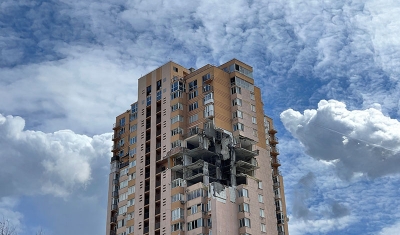Six Intense Days in the Balkans to Grasp with Current Humanitarian and Human Rights Challenges
24 February 2020
As part of the programme’s annual study trip, students of our LLM in International Humanitarian Law and Human Rights travelled to Belgrade, Sarajevo and Budapest where they met experts and institutions who work in the fields of international humanitarian law (IHL), international human rights law and international criminal law.
‘The study trip is a great opportunity for our students to go the field and learn more about the work of civil society and international organizations that implement on a daily basis the legal principles they’ve learned in class’ explains Professor Marco Sassòli, Director of the Geneva Academy.
‘As the study trip takes place at the beginning of the second semester, our students are well equipped with the tools to grasp with practical challenges and ask the right questions. The fact that the trip is organized by the students themselves also allows them to arrive well prepared and aware of the IHL and human rights issues at stake in the region’ he adds.
Exchanging with Key Actors in the Region
Students met with various actors in Belgrade and Sarajevo – the Humanitarian Law Centre in Serbia, the Mission to Serbia of the Organization for Security and Cooperation in Europe (OSCE) and the delegation of the International Committee of the Red Cross (ICRC) in Bosnia.
They learned about the work and daily challenges of these various institutions and discussed issues like the dynamics of war crimes trials before the domestic courts in Serbia, war crimes trial monitoring, missing persons, or documenting human rights violations during the wars in the former Yugoslavia.
‘Meeting with the OSCE Mission to Serbia staff was the very first stop of our trip and one of the most interesting experiences. The Head of Mission, Ambassador Andrea Orizio, provided us with an illustrative overview of the OSCE work and its growing focus on gender and youth perspective’ explains Chiara Giaccari.

A Visit to the Srebrenica Memorial
While in Bosnia, students visited the village of Srebrenica and the Srebrenica Memorial and met with survivors. This visit formed part of a larger tour, the 'Fall of Yugoslavia' tour, through which students visited many places related to the siege of Sarajevo, including the bombed children's hospital, the 'Tunnel of Hope' and the bobsled track in the Trebevic mountain that was used during the 1984 Winter Olympics and which was destroyed during the war.
‘The visit of Srebrenica transformed a piece of foreign history into reality. Walking on those grounds, you are seized by a coldness that you can't shake off, as though every tree and every particle of the land remembers. To have local people discuss the war and the contemporary situation of Bosnia was both a privilege and a sobering experience’ says Juliette Blouin.
‘It was very interesting that a few months before visiting Srebrenica we were studying cases about these atrocities in our international criminal law class. It was astonishing to see in first person the place where they occurred. What shocked me most was the proximity between the village and the mass graves all around the area, as well as the fact that survivors have chosen to still live in a place where many of their friends and relatives were massacred. The only reaction I experienced when visiting Srebrenica was silence’ Fabrizio Locuratolo.

A Well-Deserved Rest in Budapest
After five intense days in Serbia and Bosnia, students had the opportunity to visit Budapest and take a well-deserved rest.
‘In beautiful Budapest, we strolled around and caught our breath after an intense and exciting week. There were many options for activities but I chose to see the sites, eat some delicious food, do some shopping and experience the nightlife’ says Angelica Widstrom.













